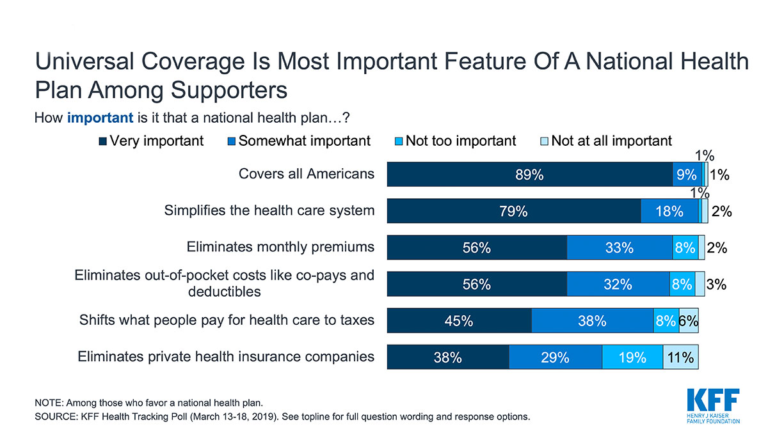Universal Coverage Contradictions
Contradicting views on Medicare for All from the electorate may slow the pace of bringing a meaningful health plan for the country.

Read Time: 2 minutes
Published:
A recent poll from the Kaiser Family Foundation asked Americans who support a national health plan which features are most important to them. A national health plan was defined as “sometimes called Medicare for All, in which all Americans would get their insurance from a single government plan.”
Of those who favor a national health plan, 89% said covering all Americans was very important. Likewise, 79% identified the need to simplify America’s health care system as a high priority. While a “national health plan” could take many forms, Medicare for All has become a popular term for universal health coverage (UHC) with a single payer for care: the federal government. Different versions of Medicare for All have been gaining traction throughout the Democratic primary race as candidates try to come up with a brand of health reform that is both popular and feasible.
Pete Buttigieg has proposed that we adopt a “Medicare for All who want it” approach where a public option is available, but individuals who like their private health insurance can keep it. Bernie Sanders and Elizabeth Warren have said we should abolish the health insurance industry in favor of a simplified, single-payer plan run by the government. This sort of a plan was favored by only 38% of poll respondents, although it was included in the definition of national health plan all respondents supported.
Just over half of poll respondents (56%) identified elimination of premiums, out-of-pocket costs, co-pays, and deductibles as the most important feature of a plan.
Any sort of national health plan would require significant government spending and likely require more and higher taxes. Yet only 45% favored a shift from what people pay for health care to what they pay in taxes. This sort of contradiction among the electorate–wanting a plan to cover all Americans, but not wanting to pay for it–will continue to slow meaningful policy change.
Databyte via Public Opinion on Single-Payer, National Health Plans, and Expanding Access to Medicare Coverage. Kaiser Family Foundation, November 26, 2019.



